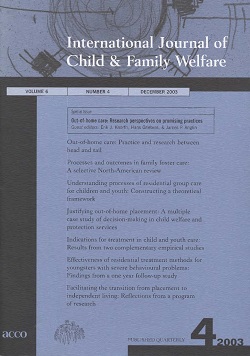Understanding processes of residential group care for children and youth: Constructing a theoretical framework
Keywords:
residential group care, framework, child and youth careAbstract
This study of staffed group homes was undertaken in British Columbia and involved 10 group care programs that were visited over a 14 month period. The grounded theory method was selected given the goal of uncovering and articulating a theoretical framework for understanding the processes of group home life and work. The core theme that emerged was 'congruence in service of the children's best interests'. Three basic psychosocial processes were discovered as core to group home functioning: 'developing a sense of normality' that speaks to the desired lived experience for group home residents; 'creating an artificial living environment' that pertains to the instrumental task of the home; and 'responding to pain and pain-based behaviour' that represents the central challenge for staff. These are interwoven processes in the life of a group home, and can be linked together as follows: the purpose of a group home is to create an artificial living environment that offers the youth residents an opportunity to develop a sense of normality while responding to their pain and pain-based behaviour. In addition, five levels of group home operation and eleven interactional dynamics were found to be significant in understanding 'the struggle for congruence' within the homes.

